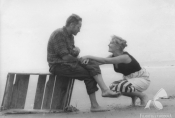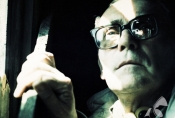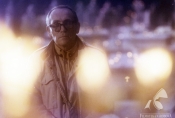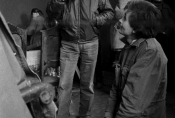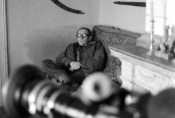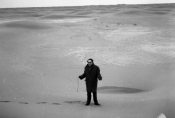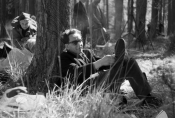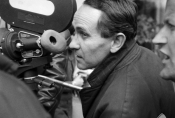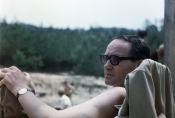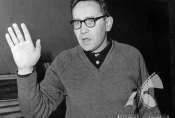Tadeusz Konwicki
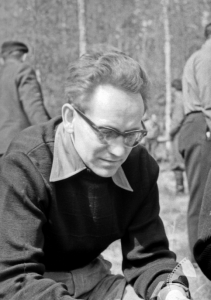
Born June 22, 1926, in Nowa Wilejka. Writer, screenwriter and film director. In 1938, he enrolled in the Sigismund Augustus School in Vilnius, attending clandestine classes during the occupation. In 1945, he enrolled for Polish Studies at Jagiellonian University in Krakow. He also started to work as a journalist at Odrodzenie weekly, moving to Warsaw in 1947 to continue his work for the magazine. It was in Odrodzenie that he debuted as a film reviewer; it was also there that he published his first novel – Rojsty (1948, book edition: 1956). A turning point was the novel Dziura w niebie/A Hole in the Sky (1959).
In this book, as well as in his later works, he tackled issues such as his own biography, the fate of his generation, the Polish intelligentsia and Polish national complexes. He placed emphasis on the category of time and remembering one’s childhood, youth, and the war. He employed grotesque, absurd and poetic themes interspersed with elements of humour, using different temporal planes, replacing the traditional structure of a novel with essay-like forms. Subsequent novels include Sennik współczesny/ A Dreambook for Our Time (1963), Wniebowstąpienie/Ascension Into Heaven (1967), Zwierzoczłekoupiór/The Anthropos-spectre-beast (1969), Nic albo nic/Nothing or Nothing (1971), Kronika wypadków miłosnych/Chronicle of Amorous Incidents (1974), Kalendarz i klepsydra./The Calendar and the Hourglass (1976), Kompleks polski/The Polish Complex (1977, unofficial edition), Mała apokalipsa/ A Minor Apocalypse (1979, unofficial edition of the novel from the so-called late Gierek era), Wschody i zachody księżyca/Moonrise, Moonset (1982, unofficial edition), Bohiń/Bohin (1987), Czytadło/Page-Turner (1992).
He shared his memories with readers in the book Pamiętam, że było gorąco/I Remember It Was Hot (2001). In the years 1956-1968, he served as artistic director of the “Kadr” Film Studio. He co-wrote three outstanding films directed by Jerzy Kawalerowicz: Matka Joanna od Aniołów/Mother Joan of the Angels (1961), Faraon/Pharaoh (1966) and Austeria (1982). In addition, he wrote screenplays for films such as Zimowy zmierzch/Winter Dusk by Stanisław Lenartowicz (1956) and Kronika wypadków miłosnych/Chronicle of Amorous Incidents by Andrzej Wajda (1974). Costa-Gavras directed Mała apokalipsa/A Minor Apocalypse based on his novel (France 1992). Konwicki played a writer in Kronika wypadków miłosnych/Chronicle of Amorous Incidents; he also starred in Andrzej Titkow’s documentaries about himself (Przechodzień/Passerby, 1984 and Całkiem spora Apokalipsa/ Quite A Large Apocalypse, 2002). In 1958, he made his debut as a director in the original psychological drama Ostatni dzień lata/Last Day of Summer, made together with Jan Laskowski. He wrote all his films himself, including the five subsequent ones he made on his own. As a filmmaker, he also focused on the dilemmas of his war-time generation, as well as their struggles with time and memory. This is best evidenced in the grotesque Salto (1965) and oneiric Jak daleko stąd, jak blisko/How Far, How Close (1972), but also in the psychological drama Zaduszki/All Souls' Day (1962). Two of his films are adaptations of literary works he found particularly important as they captured his native Vilnius region: Dolina Issy/The Issa Valley (1982, based on the novel by Czesław Miłosz) and Lawa. Opowieść o „Dziadach” Adama Mickiewicza/Lava. The Story of "Forefathers' Eve" by Adam Mickiewicz (1988).
Andrzej Bukowiecki
Selected filmography
-
1958
THE LAST DAY OF SUMMER
-
1965
SALTO
-
1971
HOW FAR FROM HERE, AND YET HOW CLOSE
-
1982
THE ISSA VALLEY
Articles
-
Lithuanian Kin
Tadeusz Lubelski
„Kwartalnik Filmowy” – Special Issue 2013: “Polish Film Scholars on Polish Cinema”
